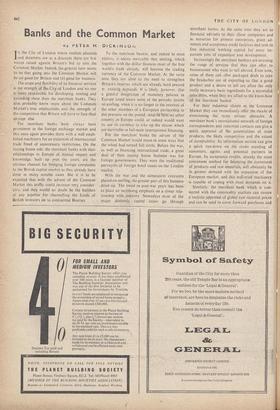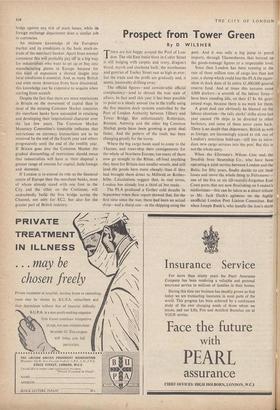Banks and the Common Market
y PETEK H. DICKINSOty
to the British capital market as they already have market. and dreamers are at a discount there are few realists, It seems inevitable that sterling, which The scope and flexibility of its financial services Britain's reserves which are already hard pressed The merchant banks have always been to, use its currency to tike up the strains which merchant banks. At the same time they act as financial advisers to their client companies .and as nurseries for pioneer enterprises, grant ad- vances and acceptance credit facilities and seek to free industrial working capital for more im- portant jobs of expansion and development.
increasingly the merchant bankers are stressing the range of services that they can offer to businessmen who want to sell abroad. Even now, some of them can offer packaged deals to take the headaches out of exporting so that a good product and a desire to sell are often the only really necessary basic ingredients for a successful sales drive, when they are allied to the know-how of the merchant banker.
For their industrial clients in the Common Market they can immediately offer the means of overcoming the more serious obstacles. A merchant bank's international network of foreign correspondents and industrial contacts can give a quick appraisal of the potentialities of most products, the likely competition and the extent of acceptability. Its information section can give a, quick run-down on the credit standing of customers, agents • and potential partners in Europe. Its acceptance credits, already the most convenient method for financing the movement of products and raw materials, will obviously be in, greater demand with the expansion of the European market, and .this well-tried machinery is capable of coping with most demands on it.
Similarly, the merchant bank which is con- nected with the commodity markets can ensure a realistic appraisal of global raw material prices and can be used to cover forward purchases and hedge against any risk of stock losses, while its foreign exchange department does a similar job in currencies.
An intimate knowledge of the European market and its conditions is the basic stock-in- trade of the merchant banker. Apart from normal commerce this will probably pay off in a big way for industrialists who want to set up or buy into manufacturing plants in Europe because for this kind of expansion a shrewd insight into local conditions is essential. And, as many British and even more American firms have discovered, this knowledge can be expensive to acquire when starting from scratch.
Despite the fact that there are more restrictions in Britain on the movement of capital than in most of the existing Common Market countries the merchant banks have succeeded in retaining and developing their 'international character over the last few years. The Common Market Monetary Committee's timetable indicates that restrictions on currency transactions are to be removed by the end of the fourth year and others progressively until the end of the twelfth year. If Britain goes into the Common Market the gradual dismantling of restrictions should mean that industrialists will have at their disposal a greater range of sources for capital, both foreign and domestic.
If London is to extend its role as the financial centre of Europe then the merchant banks, most of whom already stand with one foot in the City and the other on the Continent, will undoubtedly build the first bridge across the Channel, not only for EC2; but also for the greater part of British industry.















































 Previous page
Previous page